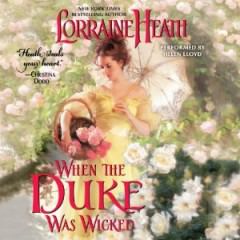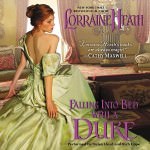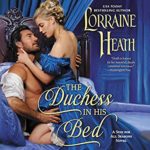 Narrated by Helen Lloyd (with James Adams, who reads the Prologue and Epilogue only)
Narrated by Helen Lloyd (with James Adams, who reads the Prologue and Epilogue only)
When the Duke Was Wicked is the first book in a new series from Lorraine Heath in which the principal characters are the offspring of those in her earlier Scoundrels of St. James books.
Lady Grace Mabury is beautiful, intelligent, generous of spirit and at the age of nineteen, the most sought-after debutante in London. But she wants to be sure that she is being courted for the right reasons, that the man she will eventually marry loves her for herself rather than for the substantial dowry her father will bestow upon her.
But how is a girl to find out such a thing? Grace thinks she has the answer to that when she turns to her childhood friend, Henry, Duke of Lovingdon for help. She reasons that, as someone who has experienced true love, he is ideally qualified to be able to tell Grace what to look for. But Lovingdon has been a widower for two years and was so devastated by the deaths of his wife and young daughter that he has withdrawn from polite society and instead spends his time gambling, drinking and shagging his way around town in an attempt to dull the pain of his loss. Even though he cares for Grace, he has finished with love in all its forms and turns her down flat.
But she is not one to be easily deterred, and decides that if Lovingdon won’t help her, then she’ll work things out for herself. But when he hears that Grace seems to favour one or two of her clutch of suitors, Lovingdon finds himself unable to maintain his disinterest and decides that perhaps a word or two in her ear now and then won’t mean he’s committed to help her – he’s just giving her the odd pointer.
Of course, Lovingdon’s pointers quickly turn into demonstrations; a man who truly loves Grace will make her toes curl with his kisses, seek out opportunities to touch her, focus entirely on her when she speaks to him, know her favourite flower and will make her feel beautiful and desired.
Even though he has finally realised that the tree-climbing, frog-catching girl he knew has grown into a beautiful woman, and even though he admits that he desires her, Lovingdon remains adamant that he is not prepared to open himself up to the pain of loss again. He does love Grace – but not in the way she wants or deserves to be loved, and maintains that he is not the man for her, despite the fact that his actions prove otherwise, over and over again.
I read the print version of this book a few weeks ago and enjoyed it very much (I gave it a B+ at All About Romance). It’s strongly characterised and the relationship between the two protagonists is infused with warmth and very well written. Right from their earliest interactions, it’s clear that these are two people who have a comfortable friendship born of long-standing acquaintance and affection. Later in the book, there’s a lot of emotional intensity when we discover the reasons behind Grace’s insistence on finding a man who truly loves her for herself, and also when Lovingdon has to make some difficult choices.
I’ve not listened to Helen Lloyd before, and while she certainly has a lovely speaking voice, I’m afraid her performance as a whole leaves a lot to be desired. Her character differentiation is minimal – males and females are performed in almost the same register and there is very little difference between characters of the same sex. Lovingdon, who, in the book, is sexy and more than a little bit naughty (in the best of ways!) here sounds pedestrian and, frankly, as though he’s permanently annoyed with Grace. His tone doesn’t alter, regardless of whether he’s teasing, angry or seductive, and that’s a real let-down, because he’s actually a lovely hero.
I’m not a big fan of very young heroines (as I get older, my view of what constitutes “very young” seems to change!) but even though Grace is only nineteen, I found her to be a wonderful character. She’s charming and witty and it was refreshing to have a beautiful, popular heroine who wasn’t a bitch or an air-head. But she sounded too old. It’s not that I wanted her to sound like a brattish teenager, but Ms Lloyd’s portrayal contained little of the vivacity that made Grace so appealing in print.
One of the best things about the book when I read it – and the thing that captured my attention right away – was the strong sense of connection between the central couple. For me, discovering that emotional bond is the highlight of any romance –whether it exists from the start, or grows throughout the story – and it’s there between Grace and Lovingdon right from their very first exchange. The early scene, in which Grace asks for Lovingdon’s help and is refused, nonetheless manages to convey that there is a strong undercurrent of affection beneath his exasperation. But Lovingdon in the audio has none of that. There’s an absence of warmth and affection, and a lack of any sense of the emotional bond between them that just leapt off the page. The performance is completely devoid of the emotional depth that is required in some of the scenes in the latter part of the story, to the extent that I felt I was listening to a completely different book to the one I’d read and enjoyed just a few weeks ago.
I’m afraid this audiobook was a huge disappointment, and I really can’t recommend it. The story itself is lovely, but the narration, while beautifully delivered, is severely flawed and completely lacking in emotion. If you like Lorraine Heath’s books and/or read the Scoundrels of St. James series and want to make the acquaintance of the next generation of characters, I’d strongly suggest sticking to the print version instead.
Caz
Narration: D+
Book Content: B+
Steam Factor: Glad I had my earbuds in
Violence: Minimal
Genre: Historical Romance
Publisher: Harper Audio
When the Duke Was Wicked was provided to AudioGals for review by Harper Audio.




Too bad! What a bummer for you…..It is such a BIG disappointment when a narrator fails a good book. I can’t imagine how an author would feel in a situation as this……mad as hell I would presume.
Thanks for the informative review.
It really is a shame, Mel. I remember listening to something last year which I’d also rated highly in print, and found myself struggling to enjoy the story in audio in the same way I’d enjoyed the book. And it was really difficult to explain – after all, the story is the story is the story – but of course a less than adequate narration won’t capture or hold the interest in the same way, and that’s definitely what happened here.